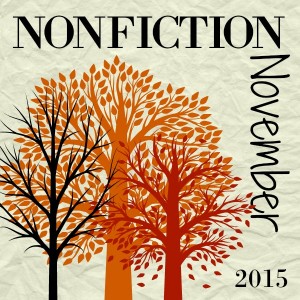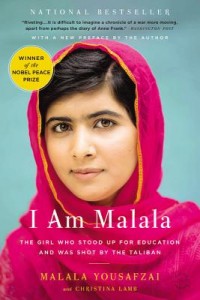 Hello, friends, and welcome to our final week of Nonfiction November, a month-long celebration of nonfiction hosted by myself, Leslie (Regular Rumination), Katie (Doing Dewey) and Rebecca (I’m Lost In Books).
Hello, friends, and welcome to our final week of Nonfiction November, a month-long celebration of nonfiction hosted by myself, Leslie (Regular Rumination), Katie (Doing Dewey) and Rebecca (I’m Lost In Books).
Rather than a formal topic the last week of the month — which often gets busy as the holiday season gears up — we decided to spend this week focusing on a single book, I Am Malala by Malala Yousafzai and Christina Lamb. Katie, this week’s host, has some discussion questions and a link up on her blog. For my post, I wanted to write a bit about ghostwriting and memoirs, something this book made me think a lot about.
 Malala Yousafzai’s story is, by this point, so well-known that she can go by her first name only. In October 2012, the fifteen-year-old was shot in the head by a Taliban operative on her bus ride home from school. Malala was targeted because of her outspoken advocacy – in conjunction with her father – for education, especially for young girls. A year after she was shot, she was the youngest recipient of the Nobel Peace Prize.
Malala Yousafzai’s story is, by this point, so well-known that she can go by her first name only. In October 2012, the fifteen-year-old was shot in the head by a Taliban operative on her bus ride home from school. Malala was targeted because of her outspoken advocacy – in conjunction with her father – for education, especially for young girls. A year after she was shot, she was the youngest recipient of the Nobel Peace Prize.
Her memoir, I Am Malala, was published just a year after she was shot and was written in collaboration with journalist Christina Lamb – something I find really interesting. Lamb wrote a piece for The Sunday Times – “My Year with Malala” – that discusses how she was hired to work on the book (a literary agent representing Malala approached her about the project) and a bit about her experience getting to know Malala and her family as they developed the memoir. As part of her work on the book, Lamb actually visited Pakistan, including the school Malala attended and the mountain villages where her parents, Ziauddin and Tor Pekai, grew up.
It seems like an incredible amount of work, yet clearly work that was needed – Malala’s story is powerful because it’s hers and because, as Lamb notes in her piece, it could be the story of many of the young women struggling to get an education across the world:
Afterwards, when I chat to Malala’s classmates, tears spring to my eyes. All of them are so eloquent and passionate about schooling, even though some of them say their brothers would withdraw them from school at the first hint of any independent thought. One of her classmates says to me: “We could all have been Malala, but our parents wouldn’t have let us speak out publicly as hers did.”
Certainly, I’m not bringing this up because I want to minimize Malala’s story, her experience, or her work in writing this memoir. As a journalist, I’m just fascinated by the idea of being hired to adopt another person’s voice and help them convey their story in what you hope will seem like their words – and how having a ghostwriter shapes the story a person is trying to tell.
I also wonder about the publishing decision to hire a ghostwriter to assist with a memoir, rather than hiring someone to write a researched biography of that person. Is there the assumption that people would rather hear a story “straight from the source” than through an interpreter? The articles I read suggested as much – celebrities get book contracts because their names can sell a book, but many need an assist to put together something worth reading.
Would this book be different if Lamb had written a “straight” biography of Malala and her family? I think so. Part of what makes the memoir effective is how poised yet childlike Malala is in the stories she tells. And I don’t think you can attribute that poise to Lamb – Malala was an experienced public speaker before she was shot, and has continued to exude confidence and warmth in her appearances since. But without Lamb’s assistance, I don’t think we as readers would have the chance to hear from her – writing a book like this is not something a 16-year-old girl recovering from an assassination attempt would have been able to do alone.
That said, I can’t wait to read a book straight from Malala herself as she continues her work as an activist for education around the world.
For some other thoughts on ghostwriting, I recommend these articles:
- So You Need a Celebrity Book. Who Ya Gonna Call? Ghostwriters (Gabrielle Emanuel, NPR)
- Memoirs written by a hired pen (Emma Jacobs, Financial Times)
- Who wrote that political memoir? No, who actually wrote it? (Paul Farhi, Washington Post)
And with that, I just want to thank everyone so much for your participation in Nonfiction November this year. If you have any suggestions for 2016, please leave them in the comments or e-mail to any one of the cohosts — we’re always looking for ideas and hope we can continue this fun event next year.

Comments on this entry are closed.
Oooh – I never realized this book was ghostwritten! And – that is a little odd to me to have a ghostwritten memoir. I just read Concussion, which was nonfiction written by an investigative journalist, but it could easily have been a memoir (it’s the story of the Doctor who first discovered brain injury in football players). But, the author includes sections of italics that were Dr. Bennet Omalu’s actual writings, which gives the reader the feeling of being in his brain. I liked this approach.
I haven’t read Malala (Underground Girls of Kabul was my 2015 NN read on this topic), but may at some point!
Ghostwriting is actually a lot more common than even I realized — the articles I linked to share a bunch of celebrity/politician authors who worked with other writers on their memoirs (and often with less writing credit than Lamb got with this book). I get why it’s done — and honestly, it seems like a fascinating career — it’s just interesting to think about how having a person that involved with the writing process might change the outcome (for good and possibly for bad).
I should have figured out this was ghostwritten but I didn’t. I thought a lot of the focus of the book was on her father and hope she will focus on herself when she writes her own story.
Yes, it’s very much a book about her family, I think because so much of her activism was possible because of her father. As she gets to have more of her own experiences, I think we’ll get to hear more of her voice and her story.
Kim, thanks for sharing this info! I had no idea that Lamb wrote the entire memoir on behalf of Malala; I assumed there was more of a collaboration, so this definitely puts a spin on things. I do think this would have been an ENTIRELY different book, had they chosen to wait until later in Malala’s life, after she had more time to process the events that took place and put them in perspective.
It’s really interesting, right? It’s really hard to know the extent of the collaboration, but I’d have to guess quite a bit. I’m actually a little jealous of Lamb — getting to spend that much time with Malala and her family, and then getting to try and help share that story. It sounds really cool.
Oh this is really interesting! Hmm, I’m trying to decide how that changes my feelings about the book. What struck me so much was Malala’s positivity about her homeland – I wonder how much is inferred I guess vs what is real? I’m looking forward to following your links!
I actually think the book is probably really accurate to what she thinks and believes — from the article, it sounds like the memoir was reviewed pretty heavily by Malala and their family. So, it seems more of a discussion of language or tone rather than content, but you know, hard to say.
It would be good to know more about Lamb’s process of working with Malala on this book. I had assumed that her role was in helping Malala to put down her own words. Now I realize that may not be the case.
However, I wouldn’t call this “ghostwriting” as Lamb is co-credited as the author. A real ghostwriter isn’t credited at all! But it’s an interesting question: why we seem to need them. We do crave stories that appear to come out of an authentic voice, even if that is an illusion. It’s also interesting that in Pakistani culture the girls are expected to deliver speeches in school that are written by someone else (father or brother)! So an entire book written by someone else and published under your name might not seem that different.
In the book I would have appreciated seeing some of Malala’s actual writings about life under the Taliban. That would have given some immediacy and authenticity to the narrative. (Assuming those weren’t ghostwritten as well.)
Thank you for Nonfiction November. I look forward to whatever you come up with next year, and thank you for inspiring me to read more nonfiction.
That’s a good point, Lamb is clearly on the book cover as a collaborator. Ghostwriter isn’t maybe the best word to use. I didn’t mean to suggest anything insidious or dishonest about it. Of course a 16-year-old recovering from a gunshot wound to the head would need an experienced partner to write something like this. It just made me curious about how one becomes a collaborator on a memoir like this — it’d be such an interesting job.
After seeing Malala speak on The Daily Show, I agree that it seems likely that the poised yet childish voice comes from her. I would prefer hearing her voice directly instead of mediated by a ghostwriter, so like you, I’m hoping to read something by Malala alone in the future!